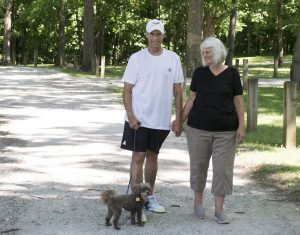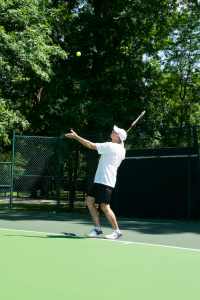
Huntley enjoys taking walks with his wife, Linda, and dog, Coco, to help
him stay healthy.
Steven Huntley is a planner—literally. For 28 years he served as the director of city planning in Noblesville where he oversaw everything from zoning applications to the enforcement of city ordinances. Retiring in 2012 didn’t change Steven’s love of order, either. He’s an organized traveler and has a map marking each Indiana road on which he has driven his yellow 2002 Corvette. He’s also meticulous about caring for his yard, which means no dead leaves allowed. Retirement was going just as Steven planned—that is until he suffered from a heart attack.
On July 4, 2017, Steven went to play a game of tennis with his friends. His wife, Linda, had encouraged him to start doing more cardio, and tennis was a sport Steven had enjoyed since college. At 9:30 a.m. it was already a stiflingly hot day, but the group of eight men were having fun. The fun wouldn’t last, though, because two and a half hours into their matches Steven felt a squeezing sensation in his chest.
“I thought I was just hot, but then in the next 30 seconds my left leg went numb, and I started to get dizzy,” Steven recalled. “I told the other guys that I was going to go sit down to rest, but when I went to walk away, I fell to my knees and had to lean against the fence for support. That scared everyone.”
Initially, Steven thought he was suffering from a heat stroke. He asked his friends to help him to his car so he could sit and cool off, but his symptoms only worsened.
“When we turned on the air-conditioning I got really light-headed, and things started to spin,” Steven said. “That’s when I told my friend to call an ambulance.”
Before Steven’s friend was off of the phone with the 9-1-1 operator, Noblesville emergency medical services (EMS) arrived. They quickly evaluated Steven by checking his blood pressure, pulse and obtained his electrocardiogram (EKG) results while en route to Riverview Health.
Dr. J. Mario Pyles, medical director of cardiovascular services at Riverview Health, was the interventional cardiologist on-call during the incident.
When asked why he didn’t hesitate to call an ambulance, Steven said it was because his symptoms were such textbook indicators of a heart attack.

“I had pain down my arm and leg and squeezing in my chest,” Steven recalled. He chuckled and added, “Also, I knew that if I didn’t call an ambulance and if I ended up dying that Linda would wake me up and kill me for it.”
After being released from the hospital, Steven decided it was time to make some major lifestyle changes. He has Type 2 diabetes, which was his primary risk factor for having a heart attack. Diabetes causes the plaque in the arteries to be less stable and break off more easily.
“I am more careful about managing my diabetes now. I watch what I eat and exercise regularly,” Steven said. “In the past, it wasn’t unusual for me to sit down and eat an entire sleeve of saltine crackers topped with peanut butter in one sitting. I try to practice moderation with my diet now, and I’m more diligent about exercising.”
However, Steven recommends that even those who feel they are relatively healthy be cautious.
“I heard from multiple nurses that I didn’t look like the typical heart attack patient. I took my diabetes medication regularly, I didn’t smoke, I wasn’t overweight, I didn’t have high blood pressure and I only had moderately elevated cholesterol prior to the heart attack,” Steven said. “My point is, even if you feel you are healthy, you should never ignore the signs of a heart attack or think it can’t happen to you.”
After he was released from the hospital, Steven completed eight weeks of recommended cardiac rehab, and he didn’t stop there. Despite having “graduated” from the cardiac rehab program, Steven continues to go three times a week to keep his strength and endurance up.
All that work seems to be paying off. It has been more than a year since Steven suffered from his heart attack, and he is back at doing what he loves: playing tennis, traveling, and taking walks with his wife, Linda, and dog, Coco. Better yet, after a follow-up stress test with Dr. Pyles, he received news that he had no permanent damage to his heart from the incident.
“I couldn’t have been happier with the care I received,” Steven said. “Riverview Health has all the expertise that the major hospitals in the area have, but you’re not just a number here. I can honestly say if it wasn’t for the EMTs and Riverview Health, I wouldn’t be here today.”
